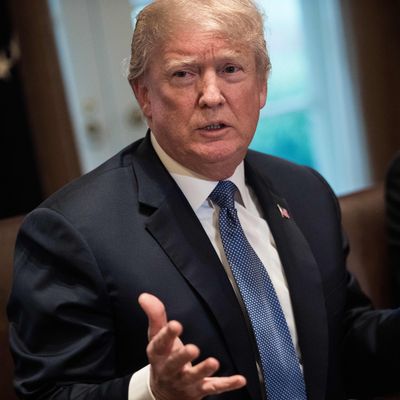
Hours after promising a speedy decision on whether and how to respond to an apparent chemical-weapons attack by Syrian government forces on rebel holdouts in Douma on Saturday night, President Donald Trump tipped his hand in the direction of punitive strikes Monday night, saying during a meeting with top military leaders that the incident “will be met and it will be met forcefully.”
“We have a lot of options militarily, and we’ll be letting you know pretty soon. Probably after the fact,” Trump said, reiterating that he and the military brass would likely make a decision either tonight or soon thereafter.
These forceful words came scarcely a week after Trump commented at an event in Ohio that U.S. forces would be leaving Syria “very soon,” because “we’re knocking the hell out of ISIS” and should “let the other people take care of it now.”
That remark came out of left field for U.S. military and national-security leaders, who talked Trump down afterward from demanding an immediate withdrawal to insisting on a plan to wrap things up in five or six months. Just don’t call that a “time line,” because Trump is very much against setting arbitrary deadlines for military withdrawals, much less leaking them to our enemies.
When Syrian president Bashar al-Assad’s helicopters (allegedly) dumped chlorine gas on innocent civilians in Douma, it was not unreasonable to see that as a response to Trump signaling that his administration was looking to end U.S. involvement Syria post haste. After all, this is what “other people taking care of it” would inevitably look like. (Israel’s alleged bombing of a Syrian air base, which reportedly killed four Iranians and ten others, is perhaps closer to what Trump had in mind in that regard.)
The White House, of course, categorically rejects this characterization of events, but it is entirely consistent with Trump’s theory that whenever the United States shows weakness or indecision, its enemies take advantage. Or perhaps that was true only when his predecessor Barack Obama did it.
Ironically, Trump, who blames the current state of affairs in Syria on Obama’s dithering, now finds himself in a situation somewhat similar to the one Obama faced in 2012: publicly committed to keeping the U.S. out of any more dubiously winnable entanglements in the Middle East, but compelled to act by Assad’s crimes against humanity. That similarity, if it is not lost on the president entirely, is more likely than not to motivate him to intervene, perhaps even more severely than he did last year when he responded to another Assad atrocity with an ineffectual volley of Tomahawk missiles.
Trump’s abrupt change of tone is indicative not of a shift in his administration’s Syria strategy, but rather of the absence of any such strategy in the first place. Impatiently pressing his generals to wrap up the fight against ISIS (which he is already taking credit for winning) and get the hell out of there, then making plans for an aggressive intervention on a whole separate front of the Syrian civil war a week later, is no more strategically coherent than Obama’s much-derided decision to draw Assad a line in the sand and subsequently refuse to intervene when the Syrian dictator crossed it.
Neither, for that matter, would it be any better for American credibility for Trump to threaten a “very tough” response and fail to follow through. Another round of Tomahawk missiles is unlikely to fundamentally change the course of the intractable conflict or impress upon Assad any need to change his behavior, much less abdicate. Given that past strikes have failed in this regard, experts tell Foreign Policy a more forceful response is more likely this time around.
There are indeed signs that Trump is contemplating a more robust intervention, including talks with the U.K. and France about a multilateral campaign. The Pentagon has presented Trump with a wide range of options; ostensibly, we’ll only find out which ones he chose “after the fact.”
Whether a major intervention at this point is wise is a separate question from whether the administration arrives at its decision thoughtfully. In all likelihood, as Heather Hurlburt explained in this space, military strikes won’t make much difference in the lives of the besieged Syrian people. Steps that might make a difference — more support for refugees and displaced people, helping with reconstruction of areas liberated from ISIS, and taking a leadership role in the international political and diplomatic process of resolving the conflict — do not appear to be on the administration’s agenda.
While the upsides of a U.S. intervention at this point are hazy, the risks involved are tremendous. As Dave Majumdar warns in the National Interest, the risk of U.S. and Russian forces coming into direct conflict in Syria threatens perhaps the most dangerous escalation of tensions between the world’s two biggest nuclear powers since the Cuban Missile Crisis.
Russia insists that the evidence of a chemical-weapons attack in Douma has been fabricated as a pretext for American aggression and has declared in no uncertain terms that it will strike back if U.S. missiles hit the Russian forces on the ground there. That retaliation would not necessarily be geographically limited to Syria, and Russia experts tell Majumdar that this is not a bluff by the Kremlin. The risk that even accidental Russian casualties of a U.S. strike would spiral into an uncontrollable escalation is something for the hawks currently clamoring for a forceful response to keep in mind.
Chemical attacks on civilians are an atrocity, and one for which Assad should be held accountable by all possible means. Expanding the Syrian civil war into a full-fledged great-power conflict would not achieve that goal. If anything, Assad would probably be delighted to have caused such a stir.





























